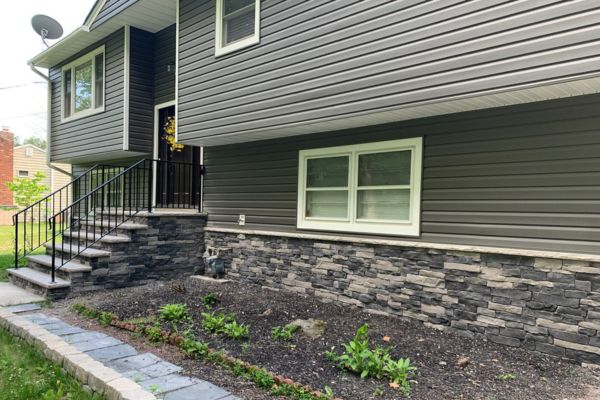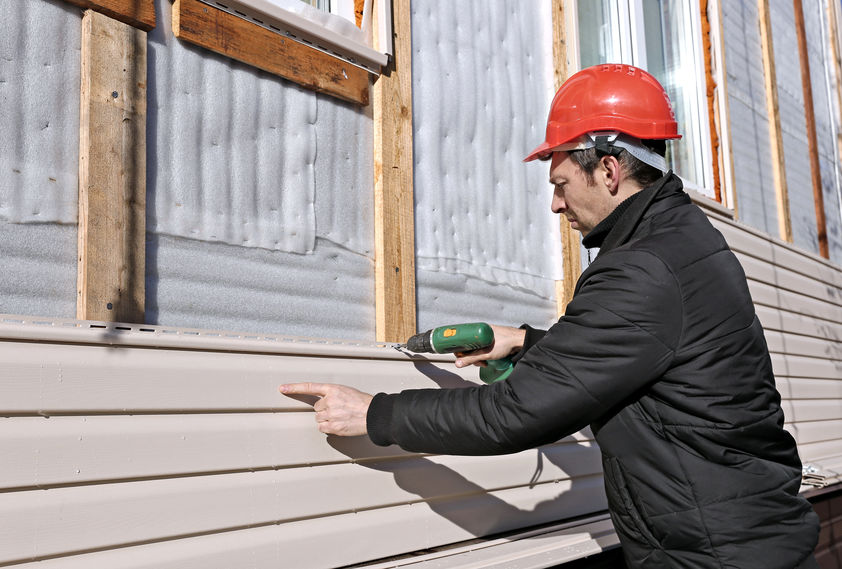Morris Siding Contractor Providing Energy-Efficient Home Exterior Installations
Morris Siding Contractor Providing Energy-Efficient Home Exterior Installations
Blog Article
The Necessary Guide to the Numerous Sorts Of House Siding and Their Special Benefits
In the realm of home renovation, picking the ideal house siding is an essential decision that influences both visual appeal and practical performance. With so lots of choices to think about, which siding material genuinely stands out for your specific project?
Wood Siding
Timber siding, a preferred option for domestic exteriors, uses a classic visual that combines all-natural charm with structural stability. This house siding product is available in various styles, including clapboard, roof shingles, and board-and-batten, allowing homeowners to personalize their façade to match their layout preferences. Wood house siding is commonly crafted from resilient varieties such as cedar, redwood, or yearn, which are recognized for their durability and capability to hold up against ecological stress factors.
One of the main benefits of wood home siding is its excellent insulation buildings, which can add to energy performance and reduced heating prices. Additionally, timber home siding is eco-friendly, making it an environmentally friendly option when sourced sustainably. Normal maintenance, including painting or discoloration, can lengthen its life expectancy and boost its appearance, permitting house owners to protect the natural charm of the wood.
Nonetheless, potential disadvantages include susceptibility to insects, rot, and climate damage, requiring sufficient treatment and maintenance - morris siding contractor. Despite these issues, when correctly taken care of, wood exterior siding can give a attractive and resilient solution that improves the character of a home while using a warm, welcoming environment

Plastic Siding
Plastic siding has actually become a leading option for house owners looking for a low-maintenance exterior choice that integrates longevity and cost. This functional product is crafted from polyvinyl chloride (PVC), making it resistant to numerous climate condition, consisting of wetness and UV rays. As an outcome, vinyl house siding does not warp, rot, or discolor, making certain long-lasting aesthetic allure.
One of the key benefits of vinyl home siding is its considerable variety of colors and designs, enabling property owners to achieve the preferred look for their property without the need for regular repainting. Furthermore, vinyl home siding is very easy to mount, which can substantially decrease labor expenses throughout building or restoration jobs.
Vinyl siding likewise adds to energy efficiency. Lots of options attribute insulation backing, which enhances thermal performance, aiding to preserve comfy indoor temperature levels and potentially decreasing power costs. Its smooth surface area assists in easy cleaning, needing only periodic cleaning with a garden tube to eliminate dust and debris.
Fiber Cement House Siding
Fiber concrete exterior siding has actually gotten traction amongst house owners and contractors alike due to its remarkable mix of durability and visual convenience. Made up of a blend of cellulose, sand, and cement fibers, this home siding choice is engineered to withstand extreme weather, including high winds, heavy rain, and temperature level variations, making it a durable choice for property exteriors.

Among the key advantages of fiber concrete house siding is its resistance to insects, such as termites, and its non-combustible nature, offering boosted fire safety and security. morris siding contractor. In addition, it is available in a large range of shades, structures, and designs, enabling house owners to accomplish their wanted aesthetic without compromising efficiency
An additional advantage is its low maintenance requirements; fiber concrete home siding typically needs painting or discoloration every 5-10 years, which is much less frequent than other products. In addition, its long life contributes to a lower total cost of possession, as it decreases the need for constant repair work or substitutes.
Eventually, fiber concrete exterior siding stands for a superb investment for those looking for a resistant, attractive, and versatile outside alternative, integrating both type and function to boost the home's aesthetic charm.
Steel House Siding
The attraction my company of metal siding exists in its durable longevity and modern-day aesthetic charm, making it a popular option for modern architecture. Available in materials such as light weight aluminum and steel, steel exterior siding offers an array of colors and surfaces, permitting homeowners to attain a customized appearance that matches their style vision.

Energy performance is an additional significant advantage, as many steel house siding items are created with insulation options that aid regulate interior temperatures. This can bring about reduced power costs with time. Furthermore, steel siding is often recyclable, making it an environmentally friendly selection for sustainability-minded property owners.
The installation process for steel siding can be fairly simple, leading to a quicker turn-around time for building and construction tasks. Generally, metal siding incorporates functionality and design, making it a practical option for those looking for a visually enticing and long-lasting exterior finish.
Block and Rock House Siding
Brick and rock siding stands apart as a timeless choice that improves the aesthetic charm of any kind of home. Recognized for their longevity and reduced upkeep, these products give a remarkable roi while boosting the property's aesthetic allure. Available in numerous colors, textures, and patterns, block and stone can be customized to fit diverse architectural styles, from conventional to contemporary.
One of the main benefits of brick and rock exterior siding is their energy effectiveness. Both materials have natural shielding residential or commercial properties that help control indoor temperature levels, possibly decreasing heating & cooling expenses. In addition, they provide superior fire resistance compared to other house siding alternatives, adding to boosted security.
One more advantage is their durability. Brick and rock can last for decades, try this site commonly requiring minimal upkeep past periodic cleaning. Unlike timber exterior siding, they are invulnerable to parasites and rot, making sure a long-lasting outside that stands up to the aspects.
Final Thought
In recap, the option of home siding significantly influences a home's visual allure, power efficiency, and maintenance needs. Each kind of house siding-- whether timber, vinyl, fiber steel, brick, or cement and stone-- supplies distinct benefits tailored to numerous homeowner choices and ecological problems. Recognizing these alternatives enables informed decisions that enhance both the durability and visual appeal of residential outsides. Ultimately, choosing the best house siding is crucial for achieving a balance between capability and layout in property style.
One of the primary benefits of timber house siding is its superb insulation homes, which can contribute to power performance and reduced heating prices. Additionally, wood exterior siding is eco-friendly, making it an eco friendly option when sourced sustainably.One of the primary benefits of steel home siding is its resistance to numerous ecological variables.Power performance is one more considerable advantage, as numerous metal home siding items are designed with insulation options that aid control indoor temperature levels. Each type of house siding-- whether timber, vinyl, fiber brick, cement, or steel and rock-- offers distinct benefits customized to various house owner preferences and ecological conditions.
Report this page